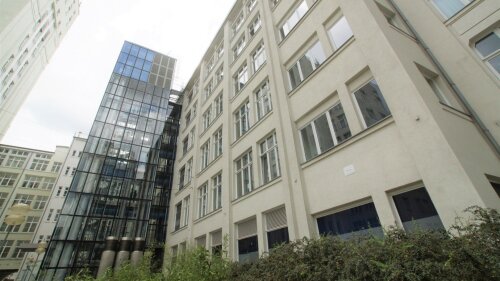
Programme content
There are many ways to become a millionaire—one of them even involves mathematics. There are six ‘millennium problems’ still waiting to be solved by a particularly clever mind. The Clay Mathematics InstituteExternal link will award one million US dollars to whoever succeeds. Well, if that is not motivation enough! But before cracking big unsolved puzzles, you need a solid foundation. In the Bachelors programme, you will study the basics of modern mathematics and you will acquire skills and competencies in the methodologies of applied mathematics as well as in computer-generated simulation, mathematical software, and programming. This is the foundation for later specializations in pure or applied mathematics, and is later complemented by a selection of minor subjects.
Many—and in fact not only technical—parts of today’s day-to-day life can only be understood with a certain knowledge of mathematics. As a student of mathematics, you will not so much study facts, but rather a way of thinking and solving problems. Here is a big difference to school mathematics! It is not so much about juggling numbers and transferring calculations to different problems, but much more about finding your own solutions and setting up proofs. You don’t mind spending several hours poring over an equation? On the contrary—you are excited about finding the solution? Then the study programme Mathematics is the right choice for you.
Structure
The bachelor's degree is the first professional qualification. The standard period of study is six semesters, during which various forms of courses (e.g. seminars, lectures or practical courses) are offered for the individual modules.
If you take a single-subject bachelor’s programme in ‘Mathematics, your field of study will comprise 180 credit points (CP for short; 1 CP = 30 hours for attendance, preparation and follow-up work, private study, assessed coursework and examinations).
In the first three semesters, you will learn the basics of mathematics. From the fourth semester, you have the opportunity to set your own focus in the required elective area.
By the way: We organize a bridging course in mathematics to prepare you for your studies and strongly recommend all students to participate.
How might your degree programme shape up?
This table is an example of how your studies in ‘Mathematics’ could be structured:
| 1st semester | 2nd semester | 3rd semester | 4th semester | 5th semester | 6th semester |
| Analysis 1 (9 CP) |
Analysis 2 (9 CP) |
Proseminar (3 CP) |
Statistical Methods (6 CP) |
Bachelor thesis (12 CP) |
|
| Algebra/Geometry 1 (9 CP) |
Algebra/Geometry 2 (9 CP) |
Measure Theory (6 CP) |
Methods of Numerical Analysis and Scientific Computing in Practice (3 CP) |
||
| Introduction to Relativity Theory and Statistics (6 CP) | Introduction to Numerical Analysis and Scientific Computing (9 CP) |
||||
| Programming (3 CP) |
Required elective area: Modules Pure Mathematic (minimum 18 CP), Applied Mathematics /Stochastics (minimum 9 CP) (48 CP in total) |
||||
| Required elective area: Modules Specialization1 (15 CP), Seminar (3 CP) |
|||||
| Minor subject and interdisciplinary content (general key qualification): Minor subject2 (minimum 15 CP) and general key qualification (minimum 6 CP) (30 CP in total) |
|||||
Abbreviations: CP = credit points
1 In the area of specialization, you can take modules from the fields of Algebra, Analysis, Numerical Analysis, Optimization, Stochastics, Scientific Computing, Algorithmics / Theoretical Computer Science
2 Application-oriented subjects include Computer Science, Linguistics with a focus on Computational Linguistics / Speech Technology, Physics, Psychology, Sociology, Medical Data Science and Economics.
More detailed information can be found in the module catalogue for the study programme [in German]External link.
Why study in Jena?
What makes studying Mathematics in Jena special for me is the freedom to deepen one’s knowledge in a wide variety of topics from the very semester and to learn new things according to one’s own interest. The city is as diverse as the study programme: You can hike on the limestone cliffs, listen to classical music by the Philharmonic Orchestra, or enjoy an evening in a bar with friends.
Helen Würflein, Mathematics student
- Optimum support: Lectures are delivered in front of small groups of students. This gives you the opportunity to come into direct contact with lecturers and also creates space for individual discussions and a family-like atmosphere.
- Excellent research: Priority areas include ‘complex systems’ as a University project, topics from analysis, stochastics, algebra and geometry, as well as gravitational-wave astronomy.
- Award-winning introductory phase of studies: In the first semesters, we support our students in many ways with the help of a concept consisting of classroom exercises in all courses, individual support in the ‘MatheCafé’External link and the annual exam preparation weekend.
- Possibilities without borders: Experience internationality! The University attracts students and scientists from all over the world with its appealing conditions and shapes Jena's character as a future-oriented and cosmopolitan city — ideal conditions for international prospective studentmp4, 55 mb.
- Adventure abroad: If you dream of spending a semester abroad, you can easily make it come true. Our University has a worldwide network of partner universitiesExternal link.
What can you do after your studies?
Areas of employment for graduates
Student working on a diagram
Image: Designed by rawpixel.com / freepik.com- business (industry, banks, insurance companies, consulting agencies, IT service providers)
- administration, research and teaching at higher education institutions (with a master’s or doctoral degree)
- data processing (software development, project planning, system consulting, database administration)
- product development (modelling or simulation of complex projects, mathematization of problems, optimization of production processes)
- management (planning, warehousing, quality assurance, market research, business consulting and business statistics)
Downloads and links for the degree programme
What are we looking for in prospective students?
- understanding of mathematical thinking
- interest in solving problems with a logically structured approach
- enthusiasm for mathematics as an intellectual challenge
- good computer skills
- enjoying the exactness of mathematical expression
Admission requirements
-
University entrance qualification
A university entrance qualification, such as a general secondary school leaving certificate, is required for admission onto the study programme.
More information on university entrance qualifications can be found here.
-
Language requirements
Admission and language requirements for applicants of foreign nationality and without German Abitur: www.uni-jena.de/en/study-orientation-international
Contacts
Room 3537
Ernst-Abbe-Platz 2
07743 Jena
Google Maps site planExternal link
Room 3329
Ernst-Abbe-Platz 2
07743 Jena
Google Maps site planExternal link
Postal address:
Friedrich-Schiller-Universität Jena
Fakultät für Mathematik und Informatik
Studien- und Prüfungsamt
Ernst-Abbe-Platz 2
07743 Jena
Room 3227
Ernst-Abbe-Platz 2
07743 Jena
Google Maps site planExternal link
University Main Building / SSZ
Fürstengraben 1
07743 Jena
Google Maps site planExternal link
Office hours:
We offer consultations in person, by telephone, and via Zoom. You can make an appointment by calling us on +49 3641 9-411111 (Mondays to Fridays from 9:00 to 11:00) or outside these office hours on +49 3641 9-411200. You can also use our remote help desk.
Consultation hours:
Mondays, Tuesdays, Thursdays and Fridays (9:00 to 12:20), Tuesdays (14:00 to 18:00), and Wednesdays and Thursdays (14:00 to 16:00).
Video chat: To the video chat – Zoom Videochat ZeitenMondays to Fridays (12:30 to 13:00) Password ZSB2020 Data protection informationpdf, 101 kb
University Main Building, Room E065
Fürstengraben 1
07743 Jena
Google Maps site planExternal link
Opening hours:
Information Desk (UHG; Room E0.65)
Mondays (10:00 – 12:00)
Tuesdays (13:00 – 15:00)
Wednesdays (10:00 – 12:00)
Thursdays (13:00 – 15:00)
Fridays (10:00 – 12:00)
You can also use our remote help desk at
www.uni-jena.de/service-ssz
or send us your enquiries by post.
Telephone hours:
Mondays to Fridays
(9:00 – 11:00)
Postal address:
Friedrich-Schiller-Universität Jena
Studierenden-Service-Zentrum
07737 Jena
University Main Building
Fürstengraben 1
07743 Jena
Google Maps site planExternal link

